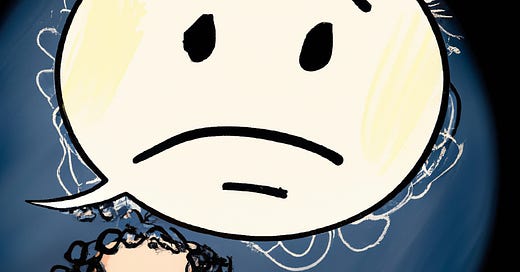
Imagine stubbing your toe extremely painfully. Introspecting on the experience, you say: “This feels awful!” In another possible world, the psycho-physical bridging laws are flipped around so that our neural correlates of pain instead produce pleasure, and vice versa. But this twin world is physically just like ours. So your inverted twin stubs their toe, extremely pleasantly. They frown and curse just as you do. And introspecting on their (pleasant) experience, they say: “This feels awful!”
The Possibility of Disharmony
Such psychophysical disharmony seems extremely weird. Some even take it to be an objection to dualism. If physicalism is true (the thought goes), there are no such inverted worlds to worry about. The neural correlates of pain just are pain, and a single thing cannot be separated from itself, the way that dualist pain can be separated from its physical underpinnings.
But, as Helen explains in her (2022) ‘Dualism all the way down: why there is no paradox of phenomenal judgment’, this gets the theoretical merits backwards. There’s every reason to grant that these weird possible worlds are possible; we just don’t want to be landed with the view that they’re plausibly actual:
It might seem strange to think that I could easily have believed that [pleasure feels awful] (had only the bridging laws been different). But this is the flip side of something that is a clear benefit of epiphenomenalism. Intuitively, there is no contradiction in two people being physically alike, but color-inverted. Physicalists cannot account for this intuitive datum, and this is often taken to be a challenge to physicalism. But this is simply another instance of the same point that is now being taken to be a counterintuitive consequence of epiphenomenalism: the contingency of the connection between neural states and experiences.
… The idea that we might actually be wrong about our phenomenal judgments is intuitively preposterous. But the epiphenomenalist does not think this. Suppose I reflect on the pain in my arm and think of it “this feels bad”. Pain—with its horrible qualitative nature—is a part of my mind. The badness of pain is plausibly not only a part of my mind but a part of my evidence base. (Albeit one that I can only access provided my brain functions so as to cause such a thought.) But when I do reflect and judge that pain is bad, the badness of pain is before me, there as part of my mind. So it would be wrong to think that I might actually be wrong in making this judgment. Rather, the epiphenomenalist thinks that we could have been wrong in our phenomenal judgments. I could have lived in a world with unfortunate bridging laws. In [that] world, I would be a conscious agent who thinks in word-salad: asserting that manifestly wonderful experiences are bad. While this may be unsettling, it also seems intuitively right. There is nothing inconceivable about people who behave just like us in responding to tissue damage (including at the neural level), and yet feel pleasure when it occurs—just as there is nothing inconceivable about having red experiences when looking at a green leaf. Epiphenomenalism gets logical space right; those who would deny the contingency of our phenomenal judgments get it wrong.
In a footnote, she observes that interactionist dualism is in the same boat as epiphenomenalism here:
One might think that interactionist dualism would allow us to hold that [experiences and physical states] cannot come apart in ways that generate irrational thoughts like “pleasure is bad”. But this is just as much a [possibility] for interactionists as it is for epiphenomenalists, for there’s no reason to think that it would be impossible for pleasure to cause the thought “this is horrible”. Such a thought may be irrational, but it is not inconceivable that pleasure cause such a thought.
Is our psychophysical harmony likely or lucky?
Besides the questions of whether disharmony is metaphysically possible (yes) and whether we can nonetheless know it’s not actual (also yes, at least insofar as our own current experiences are concerned), there’s a further interesting question whether there are a priori grounds for regarding weird disharmonious worlds to be less likely than harmonious ones.
Helen suggests that “a fine-tuning argument based on fine-tuning the bridging laws is the strongest argument in favor of God”—an argument that’s further developed by Brian Cutter & Dustin Crummett.
But I don’t see the possibility of disharmony as all that different from other radical skeptical scenarios, e.g. that the universe just sprang into being, in its current form, five seconds ago. (Or that grue and bleen, rather than green and blue, are the truly projectable predicates for purposes of induction.) These are all genuine metaphysical possibilities, but to avoid radical skepticism, I think we just need to make our peace with considering wacky scenarios to have objectively low a priori probability.
It would be nice to be able to systematize this in terms of “simplicity” or some such, but I don’t think it’s necessary. It isn’t obvious to me that including the entire past makes for a possible world that’s “simpler” than an alternative that only contains the present moment. But I’m nonetheless very confident that the past is real. And there’s no empirical evidence that could distinguish whether or not the past is real, so I’m committed to this being a priori. That is:
We rationally ought to assign lower a priori probability to (A) a “just popped into existence with fake history” universe containing just our present moment than to (B) a “full-history” universe that leads up to our present moment. Moreover, we can take this to be a brute epistemic fact, if need be.
In much the same way, I’m inclined to think:
We rationally ought to assign lower a priori probability to psycho-physically disharmonious worlds than to harmonious ones. Moreover, we can take this to be a brute epistemic fact, if need be.
Again, it would be nice if a more systematic explanation (in terms of simplicity or such) were available. But I’m not going to leave my anti-skepticism hostage to something so uncertain. I’m fine with it being brute: we can recognize that some possible worlds are more intrinsically credible than others, regardless of whether we can give a systematic explanation of why this is. Moreover, if there is to be a further explanation, I think it’s important that it be suitably intrinsic: it should be something about the wackiness of the disharmony itself (such as its inherent complexity, or something) that explains the low probability of the disharmonious universe.
That latter point is why I don’t like the God explanation. Sure, you could posit that God is considerate enough to want to spare us from disharmony. In the same way, you could posit that God would want to spare us from the massive deception of a “just popped into existence 5 seconds ago (with fake memories and apparent history)” universe. But that seems too… extrinsic… to me. We shouldn’t have to resort to outside agency to explain the difference in credibility between full-history worlds and fake-history worlds. They differ in intrinsic credibility! And likewise for harmonious vs disharmonious ones.
Conclusion
The space of possible worlds is vast, and contains many weird—or even downright bizarre—possibilities. It’s a good feature of a view that it recognizes the full space of possibilities here. But we should judge these bizarre possibilities to be intrinsically less credible (i.e., have lower a priori probability). Some may be tempted to appeal to God as a quick fix, but this locates the solution in the wrong place. Wacky possibilities should be less likely because they’re objectively wacky, not just because God is less likely to prefer them. After all, God is also less likely to prefer worlds containing immense wild animal suffering. But there’s nothing intrinsically incredible about the latter sort of world. (One appears to be actual.) If we want to differentiate psychophysical disharmony from wild animal suffering, we need to appeal to something other than the preferences of a benevolent deity.
















An interesting response from Brian Cutter on the public FB thread: https://www.facebook.com/richard.chappell/posts/pfbid0r8rNLkNHF6dq61VHyZsaURXSULRNMJNtDPKBiJggEXT2Da9NDyUPccUUdQhQGnpkl?comment_id=278901985045766
Here’s a plausible principle: the prior probability of some set of initial conditions doesn’t depend on the higher order properties of it. For instance, things following the shroedinger equation aren’t more likely simply because they’ll result in complex things. But if this is true, then your solution runs into troubles -- the likelihood of psychophysical laws can’t have anything to do with whether they cause humans with accurate beliefs.